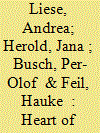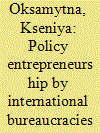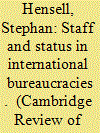|
|
|
Sort Order |
|
|
|
Items / Page
|
|
|
|
|
|
|
| Srl | Item |
| 1 |
ID:
179328


|
|
|
|
|
| Summary/Abstract |
Expert authority is regarded as the heart of international bureaucracies’ power. To measure whether international bureaucracies’ expert authority is indeed recognised and deferred to, we draw on novel data from a survey of a key audience: officials in the policy units of national ministries in 121 countries. Respondents were asked to what extent they recognised the expert authority of nine international bureaucracies in various thematic areas of agricultural and financial policy. The results show wide variance. To explain this variation, we test well-established assumptions on the sources of de facto expert authority. Specifically, we look at ministry officials’ perceptions of these sources and, thus, focus on a less-studied aspect of the authority relationship. We examine the role of international bureaucracies’ perceived impartiality, objectivity, global impact, and the role of knowledge asymmetries. Contrary to common assumptions, we find that de facto expert authority does not rest on impartiality perceptions, and that perceived objectivity plays the smallest role of all factors considered. We find some indications that knowledge asymmetries are associated with more expert authority. Still, and robust to various alternative specifications, the perception that international bureaucracies are effectively addressing global challenges is the most important factor.
|
|
|
|
|
|
|
|
|
|
|
|
|
|
|
|
| 2 |
ID:
158028


|
|
|
|
|
| Summary/Abstract |
The UN Secretariat’s role in the expansion of peacekeeping after the cold war is debated. Different theoretical accounts offer competing interpretations: principal–agent models and sociological institutionalism tend to emphasize the Secretariat’s risk-averse behaviour; organizational learning scholarship and international political sociology find evidence of the Secretariat’s activism; constructivism analyses instances of both. I argue that the UN Secretariat can be both enthusiastic and cautious about new tasks depending on the circumstances and the issue area. For example, UN officials have been the driving force behind the development of public information campaigns by peacekeeping missions aimed at the local population. During the cold war, it was not regarded as necessary for UN missions to communicate with the public in the area of operation: their interlocutors were parties to the conflict and the diplomatic community. With the deployment of the first multidimensional missions in the late 1980s and the early 1990s, UN staff realized the need to explain the organization’s role to the local population and provide information about UN-supported elections. In promoting this innovation, they played the role of policy entrepreneurs. The institutionalization of this innovation, however, was not an automatic process and required continuous advocacy by UN information staff.
|
|
|
|
|
|
|
|
|
|
|
|
|
|
|
|
| 3 |
ID:
153899


|
|
|
|
|
| Summary/Abstract |
Recent studies in international relations (IR) have devoted little systematic attention to the personnel of international organizations. This article argues that the works of Max Weber could provide an orientation for future research on the cohesion and autonomy of the staff in international bureaucracies. In his writings, Weber highlights the role of bureaucratic officials as an “occupational status group” or Berufsstand distinguished by their professional ethics, privileged positions, practices of social closure and a particular style of life, which is expressed in a claim to social prestige. Weber suggests a sociological analysis of bureaucratic staff, whose group character is determined by their occupation and profession. The article outlines Weber’s understanding of the administrative official by revisiting his seminal sociological and political writings. The added value of Weber’s conception for IR is demonstrated with an empirical sketch of the EU civil service, which can be analysed as a transnational status group in the making.
|
|
|
|
|
|
|
|
|
|
|
|
|
|
|
|
|
|
|
|
|